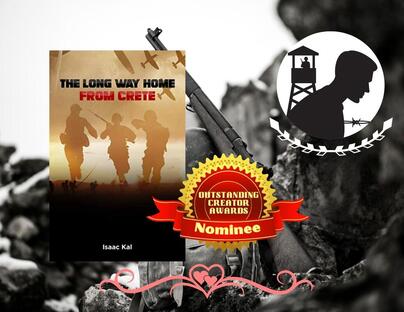|
Score: 93/100 (9.3 out of 10)
“The Long Way Home from Crete” by Isaac Kal seems to us to be a clever retelling of the classic story of Homer's The Odyssey taking place in the 20th century amid the backdrop of World War II. Similar to Odysseus' arduous journey back to Ithaca to reunite with his wife in Homer's tale, this book features the protagonist (Abraham) longing to return to his wife and home as the world seems to fall apart around him. Of all the war novels we've read this season, Kal's is probably one of the most dramatic while also being one of the least refined. This book builds and builds and builds for what seems like 150 pages. Indeed, the first half of this book, similar to “The Angels of Resistance” by David V. Mammina, is surprisingly boring, but it really picks up at that half-way point as Abraham is forced into combat and life-or-death situations left and right, even enduring capture. This is all with the budding affair of his wife, Genia, in the background, reflecting the suitors and Penelope in The Odyssey. Will Genia remain faithful or will she betray her husband in favor of the younger, more virile Jacob? But perhaps we're getting ahead of ourselves. Let's go back to the beginning. This book stars Abraham, a German Jew in the late 1930s who immigrates to Israel, the heart of Judaism, to escape the growing Nazi persecution and coming global war. Abraham becomes a sauerkraut salesperson, growing it into a rather successful business and selling to other Jews as well as Brits and even Germans. Something really special about this book is that it shows that humanity is larger than just one group of people or one nation. Humanity is diverse, multifaceted, and simultaneously one. It's subtle, but this is something that Abraham gradually understands as he experiences war, conflict, and grace from all sides, even from the Germans at some points, especially as a POW treated under the guidelines of the Geneva Conventions. He also acquires a lot of languages while being a salesperson and also while serving in war, being the master communicator and negotiator in languages such as German, Yiddish, Polish, and English. It's incredible to hear him actually offer the enemy means and incentives for their peaceful surrender, this in light of gunfire, mortar fire, and the dropping of bombs from the air. Speaking of the dropping of bombs from the air, one of the most frustrating events in the entire book is when some bombers destroy something that Abraham and his unit have been slaving over for what feels like months. It feels like about a dozen pages were dedicated to the building of that port, and we experience Abraham's sense of loss and his feelings of futility. Abraham really does grow in this book and so does our sympathy for him. In the beginning of this book, we were almost tempted to say that he was a blank-slate kind of character. We were immediately told who he was and what racial/religious affiliation he had, then all of a sudden he was getting married to a woman named Genia. He was mildly flat and uninteresting for the first hundred-something pages of this book, but that changed pretty dramatically near the end of this as he demonstrated his courage, will, and humanity. By the end of this book, you're pretty much entirely on Abraham's side, even at the expense of Genia and Jacob. Jacob can almost be considered an antagonist or secondary-antagonist (to the Germans) in that sense, at least in so far as we really don't want him to succeed and get what he wants. To the audience, for better or for worse, he hasn't earned Genia hand like Abraham has. At the same time, Jacob is not evil and neither are some of the Germans. Many of the characters, protagonists and antagonists alike, seem to be doing what comes natural to them. The Germans are fighting to win a war that their leaders started and because it's their job to fight, the Allies are fighting to defend their families and homelands, and Jacob genuinely seems to love Genia. Yes, she's technically married, but she's also likely to be widowed. So, it's not like Jacob is trying to drive Genia and Abraham apart, he sees a legitimate opening and does what many guys would do in that situation. It doesn't make it right, but it makes it understandable. This book does have pacing issues, and almost all of the exciting stuff happens in the second half. There is a pretty interesting part of the first half in which Abraham visits Cairo, Egypt and sees the Nile River. He is enthralled by it and simultaneously horrified. He is amazed by the thought that his ancestors once slaved near that very river and that it was the lifeblood of the Egyptian civilization, but he is horrified to see people drinking its muddy waters and bathing in it. There's something very National-Geographic about that scene. If you want to read a military fiction book that features a lot of traveling, check out this book!
0 Comments
Leave a Reply. |
Archives
July 2024
Categories |

 RSS Feed
RSS Feed